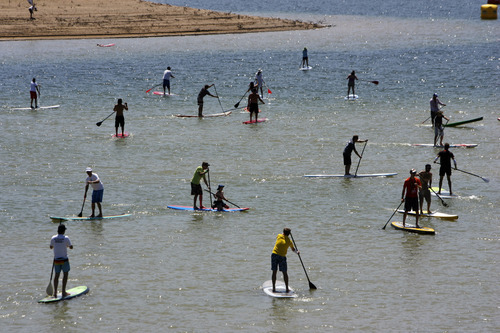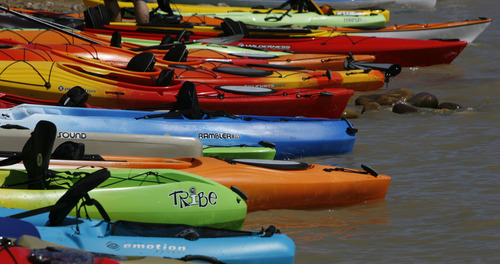This is an archived article that was published on sltrib.com in 2012, and information in the article may be outdated. It is provided only for personal research purposes and may not be reprinted.
The way Frank Hugelmeyer sees it, the burgeoning outdoor industry is just beginning to find its voice — and using it to agitate for a place at the table where big public policy decisions are made.
But it hasn't been easy for the 4,000-member group, whose leaders issued a sharply worded statement Wednesday criticizing how Utah politicians are setting public-lands policies.
Thursday, as 27,000 buyers and sellers convened at the Calvin L. Rampton Salt Palace Convention Center for the Outdoor Retailer summer show — Utah's largest convention — at least one Utah official said he found the trade group's message grating.
Rep. Fred Cox, R-West Valley City, a vocal supporter of Utah's new Sagebrush Rebellion, said he's fed up with the trade group's demands. He's tired of its seemingly endless clamoring for more hotel and convention space. And the latest request to have a seat at the table when politicians make public lands policy is "out of line," he said.
"They never have been excluded," he said, adding the group has no right to try to influence Utah's policies on constitutional issues, like a new law threatening a lawsuit if the federal government refuses to cede control of millions of acres of public lands to the state.
"They're acting like a child who does not get everything they want," Cox said. "We shouldn't ruin Utah or its economy" to bend to what he calls "blackmail and extortion."
—
Preserving lands, economy • Hugelmeyer, president and CEO of the Outdoor Industry Association, says government leaders have found it too easy for too long to ignore the interests of his trade group.
"A lot of politicians in the West, they view recreation and the businesses involved in recreation as what you do with leftover time, leftover land and leftover money," he said.
"The reality is, protecting our public lands and waters isn't just about the land — it's about protecting the economy, it's about the communities and the jobs and the lives that depend on the land and great places to play."
It's a message that ought to hit home in a political climate like Utah's, where political leaders tout the importance of luring good-paying jobs, providing a friendly environment for small business and helping existing businesses grow.
A new industry report says consumers spent $646 billion on active outdoor products and services in 2010 — almost as much as they spent on pharmaceuticals and automobiles combined. Outdoor recreation employed 6.1 million Americans, giving it a bigger payroll than public education, construction, insurance or finance.
On a national basis, that's almost three times as many people on the payroll as the oil and gas industry.
In Utah, the numbers are similarly significant: The industry means $5.8 billion in economic activity each year, supports 65,000 jobs and generates almost $300 million in state tax revenues. All this amounts to nearly 5 percent of the gross state product.
Matthew Burbank, a political scientist at the University of Utah, agrees that numbers like these should mean clout for the industry, even though it's composed of numerous small and mid-sized businesses.
—
Fragmented interests • "It's an awful lot of people and it's an awful lot of money," he said." But all of those little businesses have slightly different interests.
"Their [interests are] fragmented, and that makes it hard to organize [politically]. That's probably their single biggest problem."
Salt Lake City Mayor Ralph Becker said he understands what the trade group is after and noted the city has put forward a plan to zero in on the importance of protecting the water, recreation and economic benefits provided by the Wasatch Mountains.
Becker said the city and the county are willing to take part in resolving the differences between the state and the outdoor industry even though the dialogue has deteriorated.
"I hope we can get past that," he said. "And I'm encouraged that the governor and the industry will be able to collaborate on a common agenda."
Utah Gov. Gary Herbert expressed a similar sentiment in a statement issued from his office Thursday, the day after an hourlong closed-door session with the trade group's executive committee.
Herbert noted that there are two issues on the table: a shortage of space for the trade show, which had 300 new requests for exhibition space just this year, and having a seat at the table when Utah policymakers talk about the public lands used for recreation.
"We may have some philosophical disagreements over public land management, but I am committed to hearing all sides of the issue," Herbert said.
"At the end of the day, I think we all recognize the bottom line: The Outdoor Retailer show needs the best home to showcase their products, and I know Utah is that home," he concluded. "After hearing their input, I'm confident they agree."
Chris Fanning leads the Outdoor Foundation, a nonprofit arm of the trade group focused on creating a new generation of outdoor enthusiasts.
"If we stand together as an industry, we've got real power," Fanning said.
"If we're really going to make a difference, if we're really going to empower our young people to get outdoors and get healthier, if we're really going to ensure the future success of this industry, we need to stand together as we are today going forward."
fahys@sltrib.comTwitter: @judyfutah —
The Outdoor Retailers convention
The trade show, the state's largest, is under way through Sunday at the Salt Palace. The biannual convention is committed to Salt Lake City until 2014. But there's a question of what happens afterward, with the 46,000 people the show brings and the $42.5 million in visitor spending.





